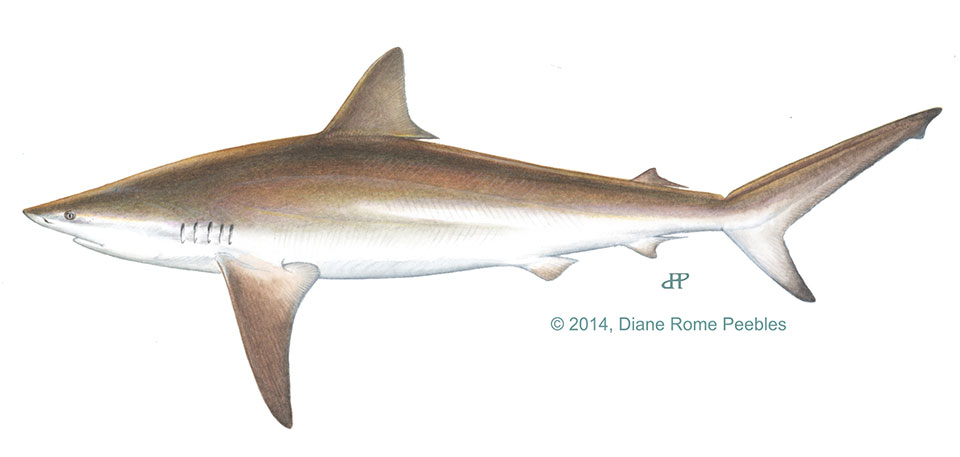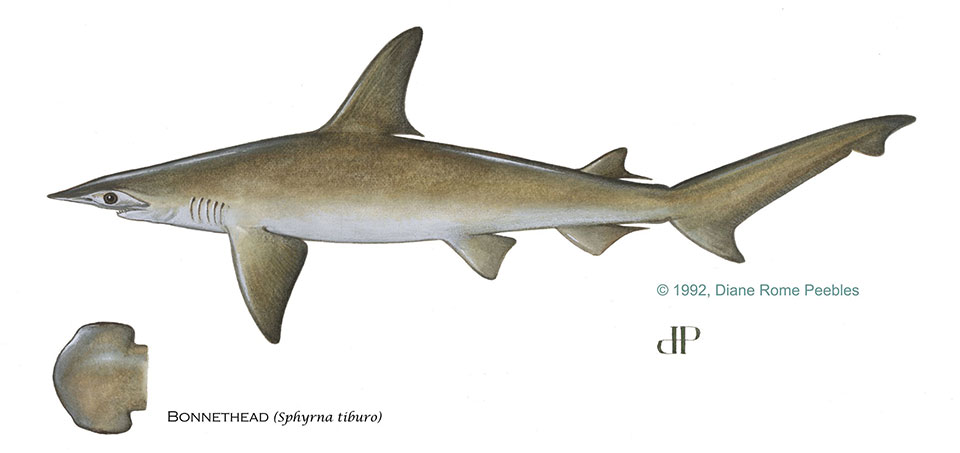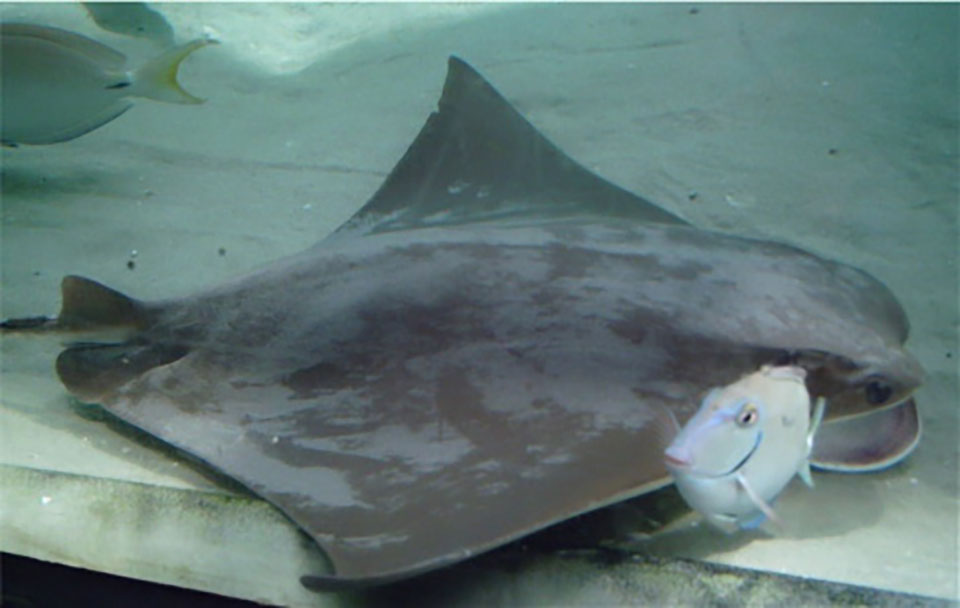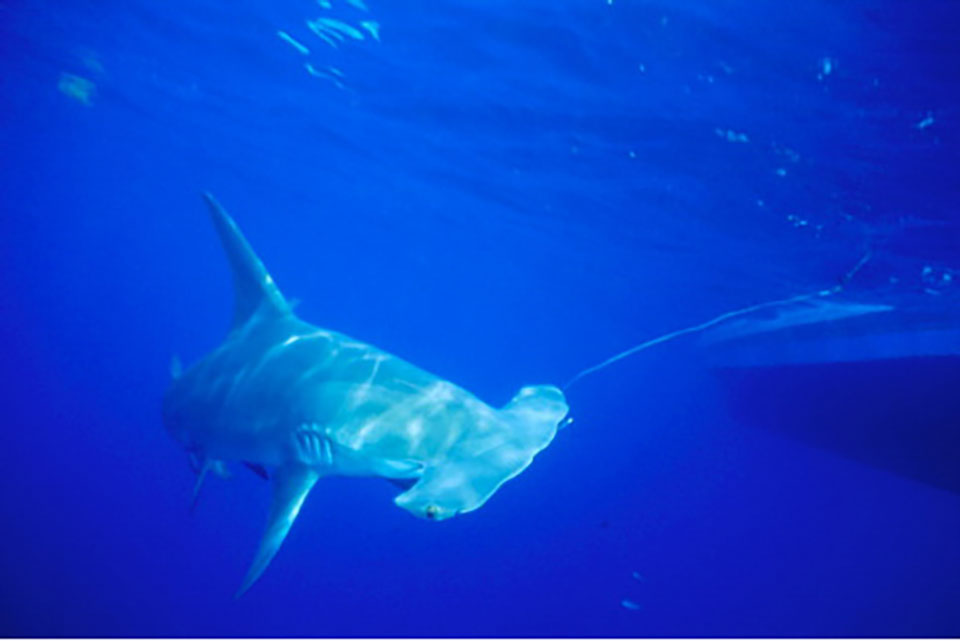Several new regulations will go into effect July 1, 2019. The required Shark-Smart Fishing educational course and the Shore-based Shark Fishing permit will be available online soon. Please check back on this page for updates.
Harvestable Sharks
Harvestable sharks fall into the following two groups of species:
Group 1 sharks (12 species) have no minimum size limit and include:
• Atlantic Sharpnose
• Blacknose
• Blacktip
• Bonnethead
• Finetooth
• Smooth dogfish and Florida smoothounds
Group 2 sharks (8 species) have a 54 inch (fork length) minimum size limit and include:
• Bull
• Nurse
• Spinner
• Blue
• Oceanic whitetip
• Porbeagle
• Shortfin mako** (See news below)
• Thresher (common)
Bag and vessel limits for Group 1 and Group 2 sharks: The daily bag limit is one shark per person per day and there is an overlapping vessel limit of two sharks. This means that the maximum number of sharks that can be retained from a vessel is two sharks even if more than two anglers are on board.

Sharks that are prohibited from harvest in state waters and include:
Atlantic angel (Squatina dumeril)
Basking (Cetorhinus maximus)
Bigeye sand tiger (Odontaspis noronhai)
Bigeye sixgill (Hexanchus nakamurai)
Bigeye thresher (Alopias vulpinus)
Bignose (Carcharhinus altimus)
Caribbean reef (Carcharhinus perezii)
Caribbean sharpnose shark (Rhizoprionodon porosus)
Dusky (Carcharhinus obscurus)
Galapagos (Carcharhinus galapagensis)
Great hammerhead (Sphyrna mokarran)
Lemon shark (Negaprion brevirostris)
Longfin mako (Isurus paucus)
Narrowtooth (Carcharhinus brachyurus)
Night (Carcharhinus signatus)
Sandbar (Carcharhinus plumbeus)
Sand tiger (Odontaspis taurus)
Scalloped hammerhead (Sphryna lewini)
Sevengill (Heptranchias perlo)
Silky (Carcharhinus falciformis)
Sixgill shark (Hexanchus griseus)
Smalltail (Carcharhinus porosus)
Smooth hammerhead (Sphyrna zygaena)
Spiny dogfish (Squalus acanthias)
Tiger shark (Galeocerdo cuvier)
Whale (Rhincodon typus)
White (Carcharodon carcharias)
For regulations on rays, visit the Unregulated Species page. Harvest of manta ray and spotted eagle ray is prohibited. For yellow stingrays, visit the Marine Life species page.
Federal HMS Permit Holders in state waters:
Recreational anglers fishing for or harvesting sharks in state waters are not required to hold the federal HMS vessel permit. However, if you arefishing from a HMS-permitted vessel, you are must comply with the permit requirements when fishing in both state and federal waters.
All HMS Angling or Charter/Headboat permit holders that wish to recreationally fish for and/or retain sharks are required to add a Shark Endorsement to their permit. To obtain this endorsement, permit holders need to complete an online shark identification and fishing regulation training course. Additionally, all HMS permit holders are required to use non-offset, non-stainless steel circle hooks when fishing for sharks recreationally south of south of 41° 43’ N latitude (near Chatham, Massachusetts – the northern extent of the dusky shark’s U.S. Atlantic range), except when fishing with flies or artificial lures.
Gear Requirements
Hook and line only. Harvest prohibited by or with the use of a treble hook or any other multiple hook (any hook with two or more points and a common shaft) in conjunction with live or dead natural bait.
Landing in Whole Condition Requirements
All sharks that are retained for use must remain in whole condition with heads, tails and fins attached until landed. Gilling and evisceration while on waters or in a fishing location is allowed.
Shark survival: why it’s important
Sharks are apex predators that play an important role in marine ecosystems. Releasing sharks in a way that increases their chance of survival is an important step toward achieving and maintaining healthy, sustainable shark populations.
Is that shark tagged?
• The recapture of a tagged shark can provide a wealth of data.
• If it is safe to do so, record the information on the tag and leave it intact and attached to the shark.
• If it is not safe to read the information on the tag, remove it by cutting the monofilament tether at the base of the tag.
Do NOT attempt to pull the tag out.
• Report the shark to the agency listed on the tag.
• Visit the NOAA Apex Predator Program for more information at na.nefsc.noaa. gov/sharks/tagging.html.


